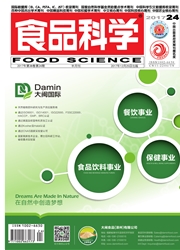

 中文摘要:
中文摘要:
探明NO处理对采后莲雾果实成熟衰老过程中絮状绵软进程的影响。以台湾‘黑珍珠’莲雾果实为材料,用不同用量(5、10、20 μL/L)外源NO熏蒸处理莲雾果实,以0 μL/L NO熏蒸处理作对照,研究其对采后莲雾果实生理及品质、细胞壁代谢及木质素代谢的影响。结果表明:与对照相比,不同用量外源NO熏蒸处理能够显著抑制莲雾果实贮藏过程中絮状绵软指数及质量损失率的上升,保持果实硬度,延缓果实纤维素含量的下降,10 μL/L NO显著降低了多聚半乳糖醛酸酶(PG)、果胶甲酯酶(PME)、β-半乳糖苷酶(β-Gal)活性。同时,不同用量外源NO熏蒸处理能够延缓果实木质素含量的上升,10 μL/L NO显著降低了苯丙氨酸解氨酶(PAL)、过氧化物酶(POD)、4-香豆酸辅酶A连接酶(4-CL)活性。相关性分析表明,絮状绵软指数与质量损失率、果肉硬度、纤维素含量和木质素含量之间均存在显著相关性,且与原果胶含量呈极显著负相关,与可溶性果胶含量呈极显著正相关。NO处理能够抑制细胞壁类物质降解酶活性,延缓采后莲雾果实絮状绵软进程,延长果实贮藏期,其中以10 μL/L NO处理效果最好。
 英文摘要:
英文摘要:
This study aimed to investigate the effects of nitric oxide(NO) fumigation on cottony softening of postharvest wax apple fruit. ‘Black Pearl' wax apple fruit(Syzygium samarangense Merr. et Perry) were treated with different concentrations of exogenous NO(5, 10 and 20 μL/L), with 0 μL/L nitric oxide as control. The fruit quality, cottony softening index, cell wall metabolism and lignin metabolism were determined. The results indicated that compared with control, different concentrations of exogenous NO fumigation inhibited significantly fruit cottony softening development and weight loss, maintained fruit firmness, reduced effectively the decrease of cellulose content. NO fumigation at 10 μL/L decreased the activities of polygalacturonase(PG), pectin methylesterase(PME), and β-galactosidase(β-Gal). Meanwhile, different concentrations of exogenous NO fumigation also retarded effectively the rise of lignin content. NO at 10 μL/L decreased the activities of phenylalanin ammonia-lyase(PAL), peroxidase(POD) and 4-coumarate:coenzyme A ligase(4-CL). Correlation analysis indicated that weight loss, fruit firmness, and the contents of cellulose and lignin were significantly correlated with cottony softening index, and that cottony softening index was correlated significantly negatively with the content of protopectin but significantly positively with the content of soluble pectin. Taken together, NO treatment decreased the activities of cell wall-degrading enzymes, and effectively postponed fruit ripening and senescence process of postharvest wax apple, and prolonged its storage life. Among different concentrations tested, 10 μL/L NO treatment presented the best effect.
 同期刊论文项目
同期刊论文项目
 同项目期刊论文
同项目期刊论文
 期刊信息
期刊信息
